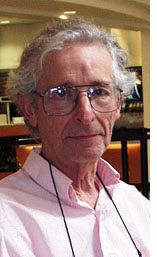My Grandfather Would have Shot Me, by Jennifer Teege and Nikola Sellmair. The Experiment, Pub. 2015, 221pp
By David Strom

SAN DIEGO — At the age of 38 Jennifer Teege was at the Hamburg central library. There she glanced at a book with a red cover and was drawn to it. From photographs in the book, Jennifer discovered that it was about people she vaguely remembered—her mother and grandmother. She took the book home and read it from cover to cover. The most amazing and shocking thing she learned was that her maternal grandfather, Amon Goeth, the butcher commandant of Plaszow concentration camp near Krakow, was not killed fighting in the war but was hanged for his crimes (The actor Ralph Fiennes played Amon Goeth in the movie Schindler’s List.)
Now she understood why no one told her or spoke about her background. Jennifer knew that her grandfather would have murdered her since she was a mixed-race black German-Nigerian. Learning the truth about her ancestry threw Jennifer in a deep depression. But it did lead to a rather tentative reconnection with her mother, Monika Hertwig, who she hadn’t seen in years.
As a baby, Jennifer was placed in an orphanage and then in a foster home. Eventually at age seven the foster parents adopted her. Occasionally her mother would visit her along with her grandmother. All the visits stopped after the adoption. Neither her mother nor grandmother ever talked about Amon Goeth, who was found guilty not for murdering of thousands of innocent Jews and many others, but for embezzling millions of dollars from the Reich. He was hanged after the Nuremburg Trials.
Though Monika did not know much about her father, as she was just a baby when he was hanged, she had suffered from the knowledge that she was the daughter of a heartless murderer. Jennifer came to realize that Monika believed that by not revealing the truth to her daughter, her mother hoped to spare her the suffering and shame that she had experienced as she attempted to reconcile her own identity with her biological inheritance.
Jennifer, then in her early twenties, did not know who Amon Goeth was, even though she studied about the Holocaust in public school in Germany. After finishing high school she moved to France and eventually went to study in Israel. After four years of study she was fluent in Hebrew and has life-long friends there.
Bothered and emotionally upset by her background, Jennifer searched for ways to integrate who she really is and wants to be with knowledge and truth of her ancestors whose genes she carries. She wanted to be honest with her Israeli friends and disclose to them about her Nazi grandfather, but initially it was too painful. It took her over a year to reveal to her Israeli friends that her grandfather was hanged as a Nazi war criminal. When she was able to share her struggle over her identity, most of her Israeli friends accepted her for who she is, which helped Jennifer move toward self-acceptance. She continues to enjoy and nurture these friendships with Holocaust survivors and their descendants today.
As she struggled to find a new sense of self, Jennifer felt somewhat alienated from her adoptive parents as she wondered: Did her adoptive parents know who her grandfather was? She eventually learned they did not know that she was the granddaughter of a Nazi murderer. Once Jennifer was emotionally stable again and happy with herself, she grew even closer to her adoptive parents and her brothers. All of them stood by her as she grappled with depression that she struggled with after she learned about Amon Goeth. She began to realize that the first generation of post-war Germans couldn’t speak about the horrible crimes. Most of their parents told them nothing or lied to them about their knowledge of the Holocaust and their active participation or denial of the ugly realities of genocide during the war. But her generation was far enough removed from the war that they could openly talk about and study about the Holocaust and not feel guilty that they had somehow inherited the deadly Nazi “virus.”
The book has universal appeal for all people who search for their identity and try to find meaning in their lives and self-acceptance to overcome a legacy of immorality and shame from a past for which only the perpetrators of crimes against humanity themselves must be held accountable.
*
Strom is professor emeritus of education at San Diego State University. He may be contacted via david.strom@sdjewishworld.com Any comments in the space below should include the writer’s full name and city and state of residence, or city and country for non-U.S. residents.
Pingback: Mixed Race Studies » Scholarly Perspectives on Mixed-Race » Mixed-race descendant of Nazi murderer tells of life